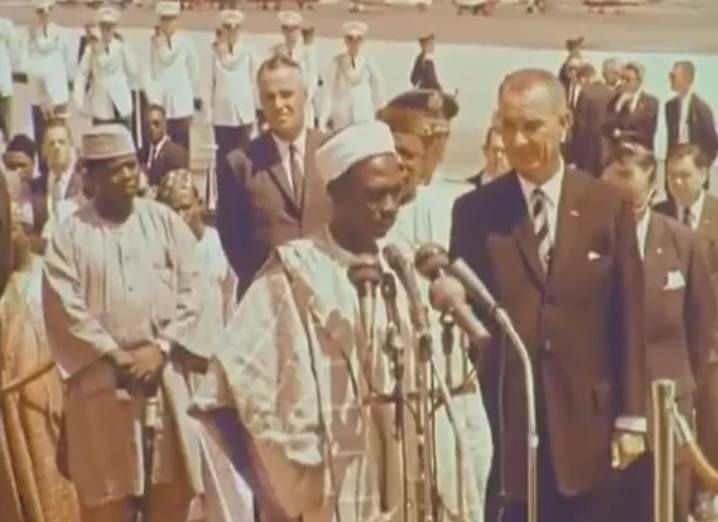After enduring years of colonisation and suffering, Nigeria finally achieved its long-awaited independence from British rule on October 1, 1960.
This historic event marked a significant turning point in the nation’s history, as it embarked on a journey toward self-governance and self-determination.
Following independence, Nigeria initially adopted a parliamentary system of government with a substantial degree of regional autonomy.
The journey towards nationhood commenced with the inauguration of the First Republic.
The country’s political landscape featured a prime minister and a ceremonial president with nominal authority.
Nnamdi Azikiwe assumed the role of governor-general on November 16, 1960, while Abubakar Tafawa Balewa became the prime minister.
However, Nigeria had not yet entirely severed its ties with the British. Some regions remained under British dominance until October 1963, when Nigeria officially declared itself the Federal Republic of Nigeria, fully breaking away from British influence.
The transition brought about a shift in the nation’s governance structure. Nigeria moved from the British parliamentary system of government to a model reminiscent of the United States. Then, the positions of prime minister and ceremonial president were consolidated into one.
In 1963, Nnamdi Azikiwe was elected as the first President of the Republic of Nigeria.
The first republic was a period of great hope and aspiration as Nigerians elected their leaders democratically. However, the era was short-lived as ethnic and regional tensions, coupled with political rivalry, culminated in a series of crises. The political instability eventually led to the first military coup in 1966.
Military Rule
On January 15, 1966, a group of mutinous Nigerian soldiers, led by Chukwuma Kaduna Nzeogwu and Emmanuel Ifeajuna, orchestrated a coup that resulted in the assassination of Prime Minister Tafawa Balewa.
One of the consequences of this upheaval was the ascension of Johnson Thomas Umunnakwe Aguiyi-Ironsi as Nigeria’s first Military Head of State.
Subsequently, a countercoup unfolded in July 1966, believed by many in the northern region to be an Igbo conspiracy. This countercoup claimed the lives of Major-General Aguiyi Ironsi and Adekunle Fajuyi.
The culmination of these events led to the Nigerian Civil War, a devastating conflict that raged between 1967 and 1970.
The military continued to wield power in Nigeria for an additional nine years following the end of the civil war. It wasn’t until 1977 that a constituent assembly was elected to draft a new constitution, which was published in September 1978.
Attempted Civilian Rule
In 1979, Nigeria attempted to return to civilian rule with the inauguration of the Second Republic.
Nigeria held another election where multiple political parties participated, and Alhaji Shehu Shagari of the National Party of Nigeria (NPN) was elected president.
Despite initial optimism, the period was marred by allegations of electoral fraud, economic challenges, and political instability. The Second Republic was short-lived, as another military coup in 1983 ended it.
Major General Muhammadu Buhari assumed leadership. His tenure was short-lived as he was overthrown in August 1985 by General Ibrahim Babangida due to abuse of authority, human rights violations by prominent military officials, and economic challenges.
Babangida’s rule ushered in a period of relative press freedom and the release of political detainees who were held without charge. However, his rule faced various challenges. In 1993, he “stepped aside” after rejecting what was considered the fairest and freest election in Nigeria’s history.
Nigeria entered a prolonged period of military rule that lasted until 1999. However, it also witnessed attempts at political transition, such as the ill-fated Third Republic, which was cut short by yet another coup in 1993.
Ernest Shonekan briefly assumed the presidency, but his rule was cut short, and Defense Minister Sani Abacha took control on November 17, 1993. During Abacha’s regime, Nigeria faced political instability and repression, leading to international condemnation.
Abacha’s presidency continued until his sudden death from heart failure on June 8, 1998. Another military leader, General Abdulsalami Abubakar, took over and initiated steps towards a return to civilian rule.
Civilian Rule
The transition to the Fourth Republic in 1999 marked a return to democratic governance.
In August 1998, Abubakar appointed the Independent National Electoral Commission (INEC) to oversee elections at various levels of government. These elections took place in December 1998, January 1999 and February 1999.
Olusegun Obasanjo emerged as the winner of the presidential election. Abdulsalam Abubakar facilitated the peaceful transition of power to a civilian president. This marked the end of 16 years of military rule in Nigeria in May 1999.
The establishment of civilian rule ushered in a new era for Nigeria. Obasanjo served as the President of Nigeria from 1999, marking the beginning of the Fourth Republic.
Subsequent presidents included Umaru Musa Yar’adua and Goodluck Jonathan. Following Yar’adua’s passing, his vice president, Goodluck Jonathan, assumed the presidency. In 2015 Muhammadu Buhari was elected president, returning to power after a military stint.
Buhari was re-elected in 2019 and served until the 2023 election, which saw the inauguration of President Bola Tinubu and Vice President Kashim Shettima.
Nigeria’s political history since gaining independence in 1960 has been a rollercoaster ride marked by significant achievements, tumultuous transitions, and enduring challenges.
The Fourth Republic has been characterized by recurring challenges, including corruption, human rights abuses, political instability, ethnic and religious tensions, and insecurity.
However, there have also been notable successes as Nigeria’s economy has experienced periods of growth.
